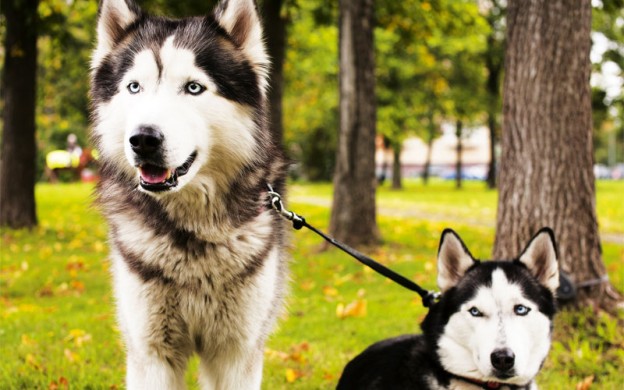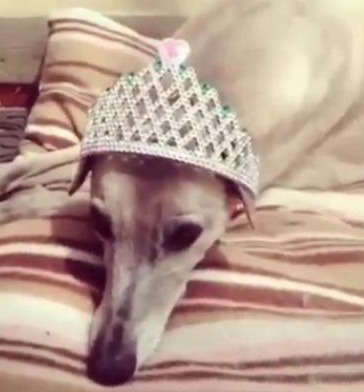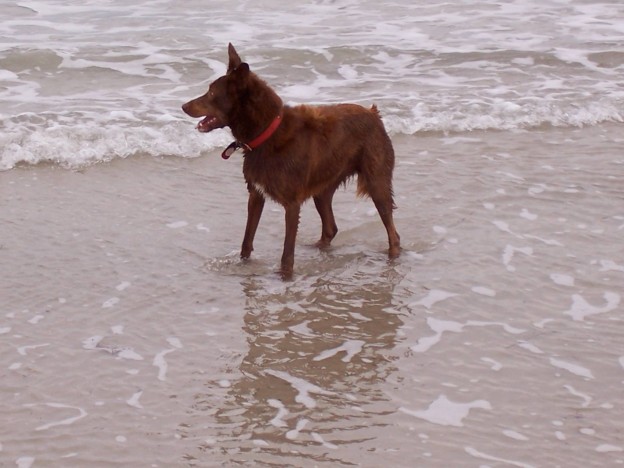
A new study reveals that, before they misbehave, dogs consider whether they’re likely to be caught. Laura Greaves investigates what is behind these common canine misbehaviours.
In my experience, it’s usually bad news when a dog suddenly falls silent. This is definitely the case with my pooch, Tex. I invariably know where to find him whenever I can’t see or hear him in the house: in the laundry, shredding socks. He loves destroying socks.
The odd thing is, Tex apparently has no interest in socks when I’m around. When it’s too wet to hang the washing outside and I drape it on an airer in the living room instead, the socks will sit there, untouched, until they’re dry.
But as soon as I’m out of sight, the Great Sock Heist begins again. Tex is a smart cookie: he’s not about to advertise his light-fingered laundry habits. Sock stealing is a solitary pursuit for him. He waits until the coast is clear and then those socks had better watch out.
According to a groundbreaking new UK study, Tex isn’t the only canine criminal mastermind out there. Researchers at the University of Portsmouth found that dogs take their owners’ “attentional state” into account when making decisions. In other words, before they misbehave, they think about whether or not we can see them.
Caught red-handed
The study saw 84 dogs participating in three different experiments designed to test whether dogs take humans’ visual perspective into account when taking forbidden food.
Each dog was placed into either a darkened or well-lit room with a human and a piece of food. In some darkened rooms, the humans’ faces were also illuminated, while in others the piece of food was in the spotlight.
The dogs were four times more likely to disobey a command not to take the food when the room was dark, regardless of whether or not they could see the human’s face. This suggests dogs are more likely to misbehave when they think we can’t see them — even if they can see us.
The study was led by Dr Juliane Kaminski, a lecturer in psychology who has an interest in comparative cognition — different species’ mental processes including attention, memory, learning and reasoning. It was inspired by her observations of her own dog’s behaviour.
“Like many dog owners, I noticed that my dog does things behind my back that he would never do when I am attentive,” says Dr Kaminski, who has an 11-year-old Rhodesian Ridgeback called Ambula.
“That made me wonder whether dogs not only take our attentional state into account when the room is fully illuminated, but whether they take into account the level of illumination in the room when making their decision.”
For animal behaviourist Kate Mornement, the findings aren’t too surprising — many dog owners have long been convinced their pets understand them. “Dogs are constantly observing us and the consequences of their behaviour. They learn to repeat behaviour, even undesirable behaviour, that has a rewarding consequence,” she says.
“Science continues to make amazing discoveries about dogs’ cognitive abilities, intelligence and emotions.”
Mornement says dogs constantly take cues from their owners, picking up on body language and actions that predict what we expect of them.
“My Boxer always gets excited when I put on my runners, for example, because he has learned that I do this in the lead-up to taking him for a walk,” she explains. “I think dogs understand their owners very well. They are much more insightful than we give them credit for.”
Deeper understanding
But while Dr Kaminski agrees the results of her study are exciting, she’s cautious about sending our four-legged friends straight to the head of the class.
“I would not say that dogs take into account the owner’s ‘wishes’. What we have here is a competitive situation over a resource — food — that the dogs want to have,” she explains. “The dogs therefore have to come up with a strategy for how to get this resource.
“Whether this means dogs really ‘understand’ what’s going on in a human’s mind is a different question and it needs future research to understand how flexible dogs’ behaviour is in relation to this.”
She says there are two schools of thought with regard to just what dogs are capable of in cognitive terms.
“Some people see dogs as something like ‘retarded’ wolves that cannot understand anything about their environment and learn by conditioning and nothing else,” she says. “Others anthropomorphise them and think that anything dogs do is human-like. They think dogs understand everything we say or do and we should treat them like we would treat a human being.
“The problem is there is simply not enough research into how dogs really behave and what they really understand. Fortunately, this is changing — in recent years research on dog behaviour and cognition has grown significantly.”
And further research isn’t far away. Dr Kaminski is in the process of opening a Dog Cognition Centre at the University of Portsmouth, where a team of researchers will further investigate just how much our canine companions understand.
“This will hopefully lead to a better understanding of the species we have been living with for such a long time,” she says.
Mornement believes studies like Dr Kaminski’s are a crucial step towards better treatment for our beloved pets. “I think that the more we learn about what dogs and other animals are capable of cognitively and emotionally, the more we will be forced to see them in a whole new light,” she says.
“I hope these discoveries help to make us more compassionate and caring towards all animals on this planet and, ultimately, towards each other.”







